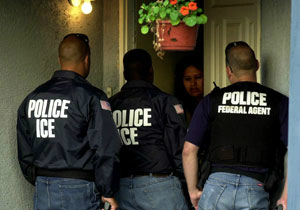
Last month, it came to light that U.S. Immigration and Customs Enforcement (ICE) was planning a series of raids aimed at Central American mothers and children who had recently arrived in the United States, many of whom were fleeing violence in their home countries. These raids are just the latest in a long series of aggressive immigration enforcement policies that have torn families apart and spread fear throughout immigrant communities across the U.S.
I first began advocating alongside families affected by immigration raids in 1996. It pains me that U.S. immigration policies have changed so little that I find myself standing with families facing the same inhumane treatment 20 years later.
In 1996, the U.S. passed the Illegal Immigration Reform and Immigrant Responsibility Act—a set of draconian laws that fueled the detention and deportation of millions of immigrants in the following years.

That same year, I assisted families affected by the first large workplace raid that took place in Iowa. About 180 immigrant workers from a meatpacking plant were rounded up and taken to an armory on the outskirts of Charles City. Men and women were held together, enduring temperatures that reached over 110 degrees. The facility had only four restrooms with no doors, no bedding or toiletries, and very limited food and drinking water. In just the 30 minutes I spent there, I was ready to faint.
Iowa and Nebraska soon became the tactics laboratory for Immigration and Naturalization Services (INS), from Operation Vanguard in 1998, which targeted workers at meatpacking plants like the one in Charles City, to 287(g) agreements, which gave local police authority to enforce immigration law.
In 2008, the largest and most infamous workplace raid in Iowa took place at a meatpacking facility in the small town of Postville—exemplifying how immigration policies violate individuals’ most basic civil rights. After the raid, INS filed civil and criminal charges against 389 workers, most of whom were from Mexico and Guatemala. Public defenders for the workers were given template packages with pre-written “plea agreements.” Judges processed as many as 10 detainees per hearing, at times in less than an hour, making a mockery of due process.
 Those of us working to assist detainees and their families became so adept at responding to raids that we developed the Immigrant Safety Network to respond to community needs within hours of a raid.
Those of us working to assist detainees and their families became so adept at responding to raids that we developed the Immigrant Safety Network to respond to community needs within hours of a raid.
Today, 20 years after the raid in Charles City, U.S. immigration policies continue to terrorize immigrants—authorized or not—on a daily basis.
In 2014, President Obama announced the new Priorities Enforcement Program (PEP), promising to focus immigration enforcement on individuals who pose threats to national security or public safety—not mothers and children. The raids that have taken place since show that the administration has continually broken that promise. ICE officials don’t follow the PEP guidelines as they should; they detain immigrants for any number of minor offenses, from public intoxication to petty crimes previously resolved even from many years ago, and often take them to facilities far away from family and lawyers.
In Iowa, we intimately know the violence and trauma that raids cause. Immigrants can be detained at work, home, or while driving. After years of accompanying families as they resisted their deportations, we’ve seen that the consequences of those raids are long lasting.
Take, for example, the case of J.A., a young man who was chatting on the porch with his siblings when he was suddenly approached by three large men in civilian clothing and—without explanation—grabbed, handcuffed, and forced into an SUV. His family thought he was being kidnapped.
They sought help immediately and were shuffled from place to place until someone from the Des Moines Civil and Human Rights Department referred them to a colleague, who referred them to me. I tried to locate J.A. in local jails, immigration facilities, hospitals—to no avail. It was past 10 p.m. that night when we learned that he had been arrested by ICE and taken to a county jail 80 minutes away.
His crime? A traffic violation.

It was heartbreaking to see the effects on his family. Family members got ill and lost weight, struggling to put food on the table after the loss of income from J. A., in addition to the legal fees to fight his deportation. For weeks, the children were terrified to play outside or go back to school. J.A.’s family is now in deep debt and lost their only car, making it harder to get to work and school.
No one should ever be subjected to this kind of treatment. Both U.S. citizens and immigrants who aspire to be citizens agree that our laws should be enforced. Yet, many also recognize that the current laws governing immigration are outdated and ignore the importance of keeping families together.
It’s been 20 years since I first began assisting families affected by immigration raids in Iowa. It’s time that the U.S. put an end to this shameful practice and wake up to the fact that the cost of imprisonment for otherwise minor offenses and the long term-effects of trauma on families are much too high.
The Obama administration can and must stop the immigration raids that have devastated communities in Iowa and across the country for far too long.